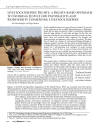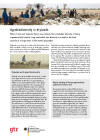Livestock Keepers’ Rights

A rights-based approach to invoking justice for pastoralists and biodiversity conserving livestock keepers
Ilse Köhler-Rollefson and Evelyn Mathias
Policy Matters 17, pp 113-115. 2010
Adapted livestock breeds enable their keepers to take advantage of common property resources. They are an important resource for maintaining food security in remote areas and in the adaptation to climate change. To ensure their long-term survival, the livestock keepers who have bred and nurtured these breeds need a bundle of rights that enable them to continue keeping these breeds and make a living from them. Players in livestock development should support the struggle of the livestock keepers for recognition during the negotiations at various international forums.
This article summarizes the three principles and five rights that make up Livestock Keepers’ Rights.
Download article 1341 kb
Agrobiodiversity in drylands

Evelyn Mathias
Deutsche Gesellschaft für Technische Zusammenarbeit (GTZ), 2010
“When it rains and drylands bloom, one realises the remarkable diversity of living organisms they harbour. Long overlooked, this diversity is crucial to the food security of a large share of the world’s population.”
This information brief describes the importance of dryland agricultural biodiversity, outlines the threats facing it, and points to the key role that local people play in conserving it.
Download 311 kb
Recognising ethnoveterinary medicine and community rights

An investment in our future
Evelyn Mathias
Presentation at the conference on “Ethnoveterinary medicine: Tradition, science, cultural richness”. Bologna, 29 October 2010. Società Italiana di Veterinaria e Zootecnia Tropicale per la cooperazione internazionale Veterinari Senza Frontiere Italia
Download presentation 1413 kb
Download summary 19 kb
- Go to the previous page
- 1
- …
- 42
- 43
- 44
- 45
- 46
- 47
- 48
- …
- 86
- Go to the next page
